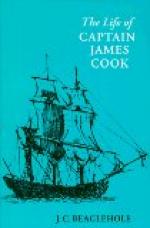On 19th September, at midnight, they weighed, sighted Teneriffe on the 23rd, and the day following their first flying fish found its way into Mr. Green’s cabin. On the 28th they tried steaks for dinner cut from a young shark, which Banks and Solander reported as very good, but the crew refused to taste them. Cape de Verde was seen on the 30th, and about a fortnight afterwards the line was crossed in 29 degrees 24 minutes West longitude, and the following day the event was celebrated. Lieutenant Hicks had crossed before, so a list was given to him of all on board, including the dogs and cats, and all were mustered on deck, those who had already crossed being separated from the others. Any one who wished could purchase immunity for four days’ allowance of wine, but the others had to pay the penalty of ducking. Banks compounded for himself and party, and Cook also seems to have got off, but the others were hauled up to the end of the main-yard on a boatswain’s chair, and then at the sound of the whistle dropped into the sea, an operation repeated three times. Cook says the “ceremony was performed to about twenty or thirty, to the no small diversion of the rest.”
Whilst near the Equator, great inconvenience was felt from the damp heat; everything was mouldy or rusty, and several of the crew were on the sick-list with a sort of bilious complaint; but it fortunately did not grow into a serious matter.
Reception at Rio.
They struck soundings on 6th November, and on heaving the lead again found a difference of less than a foot in three or four hours. Land was sighted near Cape Frio, Brazil, in latitude 21 degrees 16 minutes South, on the 8th, and they came across a boat manned by eleven blacks who were engaged in catching and salting fish. Banks purchased some fish, and was surprised to find they preferred to be paid in English rather than Spanish coin. On the 13th they arrived off Rio de Janeiro, where they were very ungraciously received by the Viceroy. They were not permitted to land except under a guard; some of the men who had been sent ashore on duty were imprisoned. Mr. Hicks, who had gone to report their arrival and ask for the services of a pilot, was detained for a time, and it was only with difficulty, and at an exorbitant rate, that they obtained fresh food and water. Consequently little was seen of the place, except from the ship, and Cook took all possible observations from thence, and made a sketch map of the harbour, to which he added all the information he was able to pick up from the pilot. Writing to the Royal Society, he says he is quite unable to understand the true reason of his treatment, and contrasts it with that received by a Spanish ship which came in whilst he was there. This Spanish ship willingly undertook to carry to Europe and forward to the Admiralty copies of the correspondence that passed between Cook and the Viceroy, which Cook describes as




